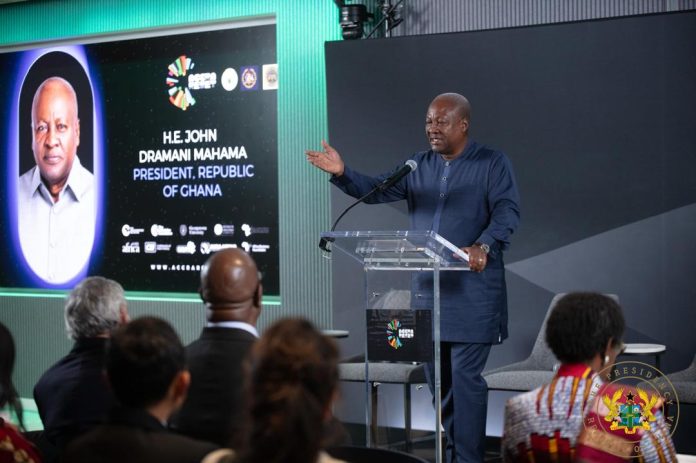Ghana’s President, John Dramani Mahama, together with a coalition of global leaders, has launched the Accra Reset, an ambitious new framework designed to transform global development financing and partnerships. This initiative was introduced during a high-level side event at the 80th Session of the United Nations General Assembly in New York. Mahama, who serves as the African Union Champion for African Financial Institutions, described the Accra Reset as a bold response to what he referred to as a “fraying” global development architecture.
He highlighted the COVID-19 pandemic, which wiped out two decades of progress in just two years, along with increasing debt burdens and extreme climate shocks that now threaten over 700 million people with hunger.”The world is only five years away from 2030,” President Mahama stated. “The question is not merely what new targets should replace the Sustainable Development Goals (SDGs), but rather how we can design institutions and financing systems that actually work. Workability is the key focus now—developing innovative financing instruments, new business models, and smarter coalitions that enhance resources instead of rationing them.”
President Mahama referenced the 2001 Monterrey Consensus that led to the establishment of key global health financing platforms like GAVI and the Global Fund. He called for a similarly bold rethinking of multilateralism—one that shifts from aspirations to sustainable value creation.
The Accra Reset introduces a new development framework based on three key principles: sovereignty, workability, and shared value. The health sector will act as the starting point and a proof of concept for this initiative, moving from aid dependency to health sovereignty. This approach builds on the outcomes of the Africa Health Sovereignty Summit that took place in Accra in August 2025.
To implement the Reset, a coalition called the Club of Accra will spearhead innovative financing and establish “geostrategic dealrooms” to promote investment in health, climate, food security, and job creation. A major announcement at the launch was the creation of a Global Presidential Council, which will unite leaders from Africa, Asia, Latin America, and beyond to ensure strong political leadership and accountability. Additionally, a Global College of Advisors will be formed, consisting of leading experts in health, finance, innovation, and business, to guide pilot projects and design new financing mechanisms.
The Accra Reset drew broad-based support from political, institutional, and private sector leaders. Former Nigerian President Olusegun Obasanjo, co-convenor of the initiative and Co-Patron of AfroChampions, called for a new era of solidarity and a shift away from aid dependency. Gordon Brown, former UK Prime Minister, described the initiative as “a plan for the future” and emphasised the importance of building health sovereignty.
A speech delivered on behalf of Kenyan President William Ruto highlighted the need for financing that matches national ambitions and called for the Global Presidential Council to be held accountable in delivering universal health coverage.
Prime Minister Mia Mottley of Barbados pledged to align skills and industrial policies to support pharmaceutical manufacturing across the Global South. Aigboje Aig-Imoukhuede, Chairman of Access Bank, promised strong private sector leadership and financing. Support also came from Dr Tedros Adhanom Ghebreyesus of the World Health Organisation and Dr Ngozi Okonjo-Iweala of the World Trade Organization, who both endorsed the need to “rewire” outdated global norms.
With the Sustainable Development Goals deadline drawing near and less than half of the 169 targets on track, the Accra Reset is being positioned as a blueprint for realigning the global development agenda with today’s urgent realities.
Source: Abigail Arthur


